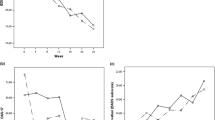Abstract
Changes in depression over the first weeks of therapy were examined in detail in patients taking part in a trial of cognitive-behavioral therapy for depression (CBT). Within 2 weeks of starting treatment, marked differences were apparent between CBT and comparison patients and, within CBT, some patients showed a very rapid response to treatment. Such rapid responders had significantly better long-term outcome than those responding more slowly. Compared to the latter, rapid responders more strongly endorsed the cognitive conceptualization of depression initially offered, reported a more positive response to initial homework assignments, and, prior to treatment, scored higher on a measure of “depression about depression.” These results support the importance of providing an acceptable rationale for treatment, followed by homework assignments that empirically validate the rationale offered. Implications for the practice of CBT for depression are discussed. It is suggested that the process of change may well be different in rapid and slow responders, and that the delivery system of CBT should be modified to take account of these differences.
Similar content being viewed by others
References
Åsberg, M., & Montgomery, S. A. (1979). A new depression scale designed to be sensitive to change.British Journal of Psychiatry, 134 382–389.
Beck, A. T., & Beamesderfer, A. (1974). Assessment of depression: The depression inventory. In P. Pichot (Ed.),Modern problems in pharmopsychiatry (Vol. 7). Basel, Switzerland: Karget.
Beck, A. T., & Greenberg, R. L. (1974).Coping with depression. New York: Institute for Rational Living.
Blackburn, I. M., & Bishop, S. (1983). Changes in cognition with pharmacotherapy and cognitive therapy.British Journal of Psychiatry, 143 609–617.
Blackburn, I. M., Bishop, S., Glen, A. I. M., Whalley, L. J., & Christie, J. E. (1981). The efficacy of cognitive therapy in depression: A treatment trial using cognitive therapy and pharmacotherapy, each alone and in combination.British Journal of Psychiatry, 139 181–189.
Fennell, M. J. V., & Campbell, E. A. (1984). The Cognitions Questionnaire: Specific thinking errors in depression.British Journal of Clinical Psychology, 23 81–92.
Fennell, M. J. V., & Teasdale, J. D. (1982). Cognitive therapy with chronic, drug-refractory depressed outpatients: A note of caution.Cognitive Therapy and Research, 6 455–459.
Hamilton, M. (1960). A rating scale for depression.Journal of Neurology, Neurosurgery and Psychiatry, 23 56–61.
Hollon, S. D., Evans. M. D., & DeRubeis, R. J. (1983, December).Final report of the cognitive pharmacotherapy trial. Paper presented at the World Congress on Behavior Therapy, Washington, D.C.
Monthly Index of Medical Specialities. (1982). London: Medical Publications.
Murphy, G. E., Simons, A. D., Wetzel, R. D., & Lustman, P. J. (1984). Cognitive therapy and pharmacotherapy singly and together in the treatment of depression.Archives of General Psychiatry, 41 33–41.
Rush, A. J., Beck, A. T., Kovacs, M., & Hollon, S. D. (1977). Comparative efficacy of cognitive therapy and pharmacotherapy in the treatment of depressed outpatients.Cognitive Therapy and Research, 1 17–38.
Spitzer, R. L., Endicott, J., & Robins, E. (1978). Research Diagnostic Criteria: Rationale and reliability.Archives of General Psychiatry, 36 773–782.
Teasdale, J. D. (1985). Psychological treatments for depression: How do they work?Behaviour Research and Therapy, 23 157–165.
Teasdale, J. D., Fennell, M. J. V., Hibbert, G. A., & Amies, P. L. (1984). Cognitive therapy for major depressive disorder in primary care.British Journal of Psychiatry, 144 400–406.
Author information
Authors and Affiliations
Additional information
This work was supported by the Medical Research Council of the United Kingdom. Many thanks to Sally Carr and David Clark for rating patients' responses toCoping with Depression and to homework assignments.
Rights and permissions
About this article
Cite this article
Fennell, M.J.V., Teasdale, J.D. Cognitive therapy for depression: Individual differences and the process of change. Cogn Ther Res 11, 253–271 (1987). https://doi.org/10.1007/BF01183269
Issue Date:
DOI: https://doi.org/10.1007/BF01183269




